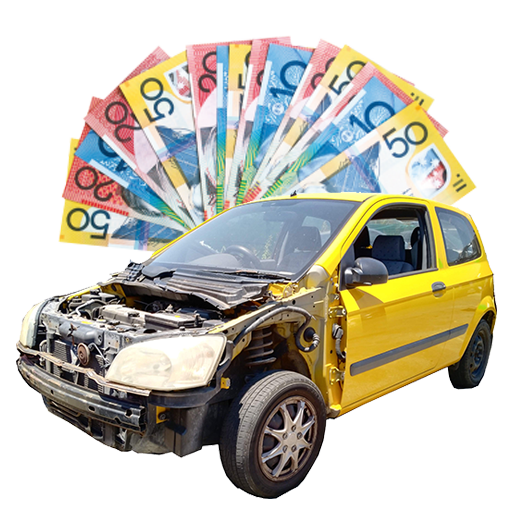So, you've got an old car sitting in the driveway, and it's time to say goodbye. In Australia, you're looking at three main ways to handle it: you can sell it for cash, scrap it for its metal value, or donate it to a good cause. What's the right move for you? Well, it really comes down to the car's condition, how quickly you need it gone, and whether your goal is to make some quick cash or just get it off your hands with zero stress.
Your Guide to Australian Car Disposal Options
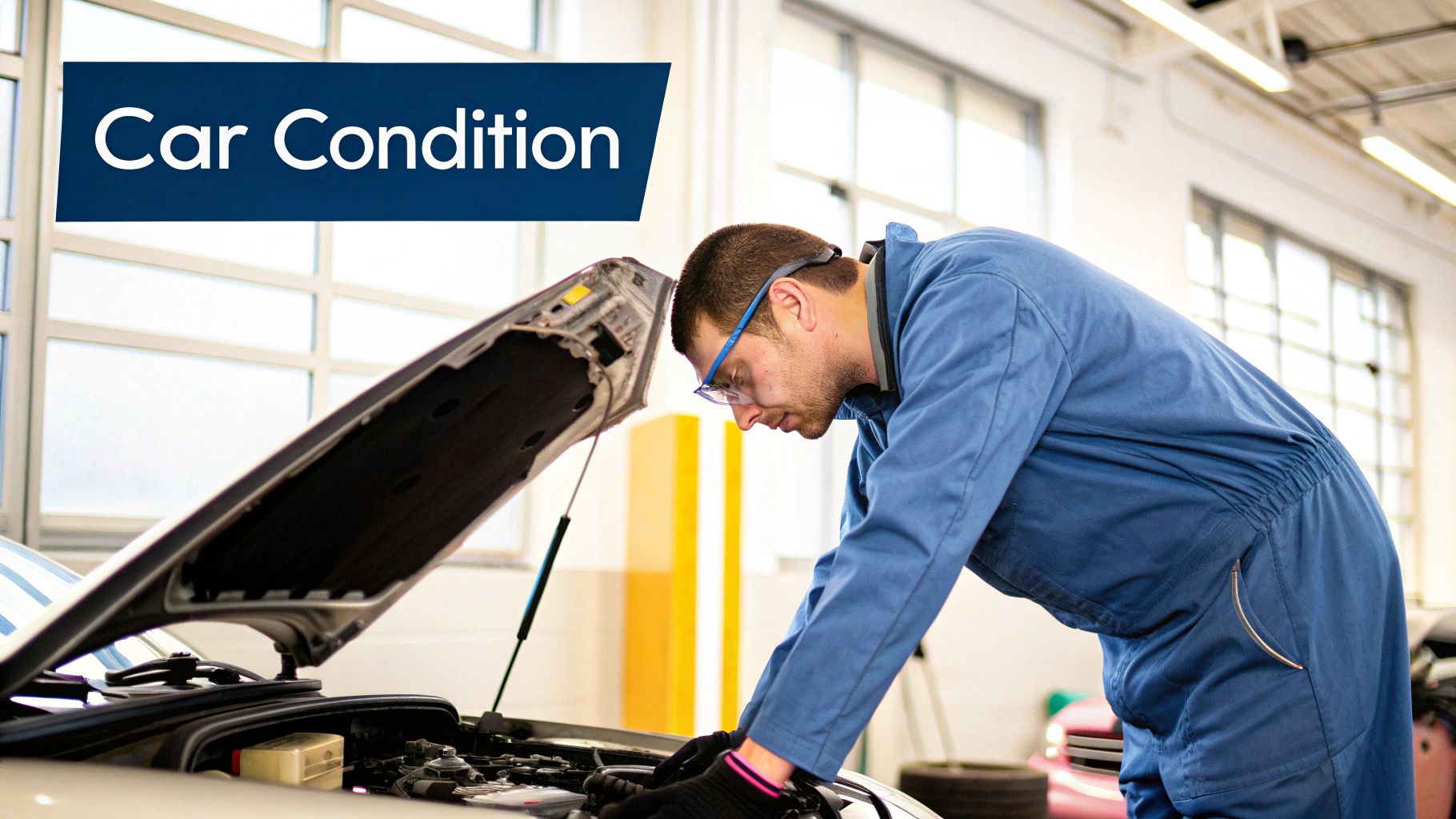
Figuring out what to do with an unwanted, broken-down, or just plain old car can feel like a massive headache. Where do you even start? This guide is here to cut through all that noise and walk you through the entire process, from start to finish.
We’ll lay out all your real-world options. You could go the route of a private sale, get it responsibly recycled by a scrap metal service, or even pass it on to a charity you support. Knowing how to dispose of a car legally and without any fuss is the key to making this a smooth ride.
Key Decisions You Will Face
The first step is making a few important calls. You need to be honest about what your car is actually worth, track down all the necessary paperwork, and then pick the disposal method that lines up with what you want to achieve.
Think about what your ideal outcome looks like:
- Maximising Profit: This usually means a private sale or stripping it for valuable parts. It’s the most lucrative path but also takes the most work.
- Ensuring Responsible Recycling: If you're environmentally conscious, choosing a certified auto wrecker guarantees that oils, fluids, and other hazardous materials are dealt with properly.
- Achieving Zero-Fuss Removal: This is where services like Auto Removal Adelaide shine. They offer fast, hassle-free collection and pay you on the spot.
Consider this guide your roadmap. We're here to help you turn that old vehicle into a win, whatever that looks like for you.
Expert Tip: Don't just take the first offer you get. The value of a scrap car can swing wildly depending on the day's metal prices and which parts are in high demand. I always recommend getting at least three different quotes to make sure you're getting a fair price.
Comparing Your Options at a Glance
Sometimes the best way to make a decision is to see everything laid out side-by-side. Trying to sell a car privately might get you a better price if it's still in decent nick, but you'll have to deal with the time and effort of advertising, viewings, and tyre-kickers. On the other hand, a scrap service offers instant cash and they do all the heavy lifting, which is perfect for a car that’s truly at the end of its life.
The table below breaks it down for you.
Car Disposal Methods at a Glance
| Disposal Method | Best For | Typical Payout | Effort Level |
|---|---|---|---|
| Private Sale | Drivable, newer cars with some market value. | $1,000 – $10,000+ | High |
| Car Scrapping | End-of-life, damaged, or non-running vehicles. | $150 – $1,500 | Low |
| Selling to a Wrecker | Vehicles with in-demand, salvageable parts. | $200 – $2,000 | Low |
| Donating to Charity | Any vehicle, when you want a tax deduction or to help a cause. | Tax-deductible receipt | Low |
Each path has its own pros and cons, but this quick comparison should give you a solid idea of which direction makes the most sense for your situation.
Getting Your Car Ready for a Hassle-Free Handover
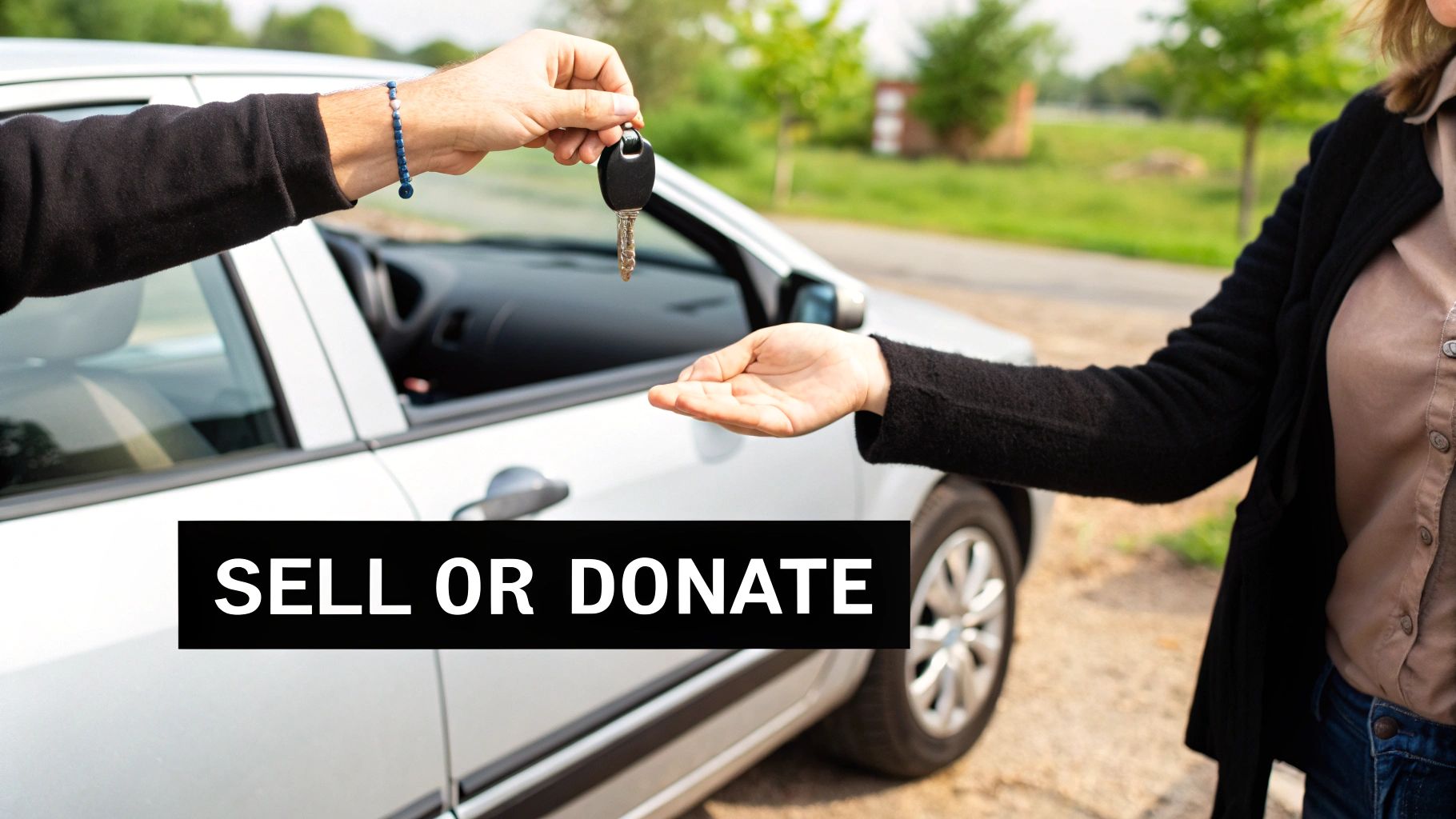
Before your car is towed away for the last time, a little bit of prep work can save you a world of trouble down the line. This is more than just a quick tidy-up; it's about protecting your personal info, ticking all the legal boxes, and making sure the whole process goes off without a hitch. Think of it as your final checklist for correctly disposing of a car.
The single most important job is to clear out every last one of your personal belongings. I've seen it all over the years—people leave everything from old sunnies and CDs to critical documents stuffed in the glove box or wedged under a seat.
Your Personal Item Checklist
It’s worth doing a really thorough sweep of the vehicle, checking every nook and cranny. I always tell people to double-check these common hiding spots:
- Glove Box & Centre Console: Pull out your registration and insurance papers (you’ll need these later), but also get rid of any old receipts or personal notes.
- Under the Seats: This is a goldmine for lost items. Get a torch and have a proper look for everything from loose change to phones and sentimental trinkets.
- Door & Seat-Back Pockets: Empty out all the accumulated junk—maps, tissues, pens, you name it.
- Boot & Spare Tyre Well: Don't forget to check around the spare tyre. You might have a personal tool kit or emergency gear in there that you'll want to hang onto.
After you've physically cleared the car, give a thought to its digital memory. Take a minute to unpair your phone from the Bluetooth and wipe any saved addresses from the GPS. It’s a simple step that ensures your personal data doesn't go along for the ride.
Sorting Out the Plates and Paperwork
With your belongings sorted, it's time to tackle the admin side of things. This part is absolutely crucial for protecting yourself from any future liability associated with the vehicle.
Your top priority is to cancel the car's registration and your insurance policy. The moment the car is sold or collected, it's no longer your legal responsibility. If you skip this, you could find yourself on the hook for parking fines, tolls, or worse. In most Australian states, you'll need to remove the number plates and hand them back to your local transport authority to officially cancel the rego.
Here’s a pro tip: take a few quick photos of the car right before it leaves your property. Having time-stamped pictures that show its condition can be a lifesaver if any disputes come up later on. It’s simple, free proof of how things stood at the point of handover.
One final thought—if the car has been sitting for ages and is destined for the scrap heap, it’s a good idea to disconnect the battery. While a dead battery is pretty standard in this situation, making sure it’s disconnected prevents any odd electrical issues during transport. Taking these steps creates a clean, legally sound break for everyone involved.
Navigating the Paperwork and Legal Requirements
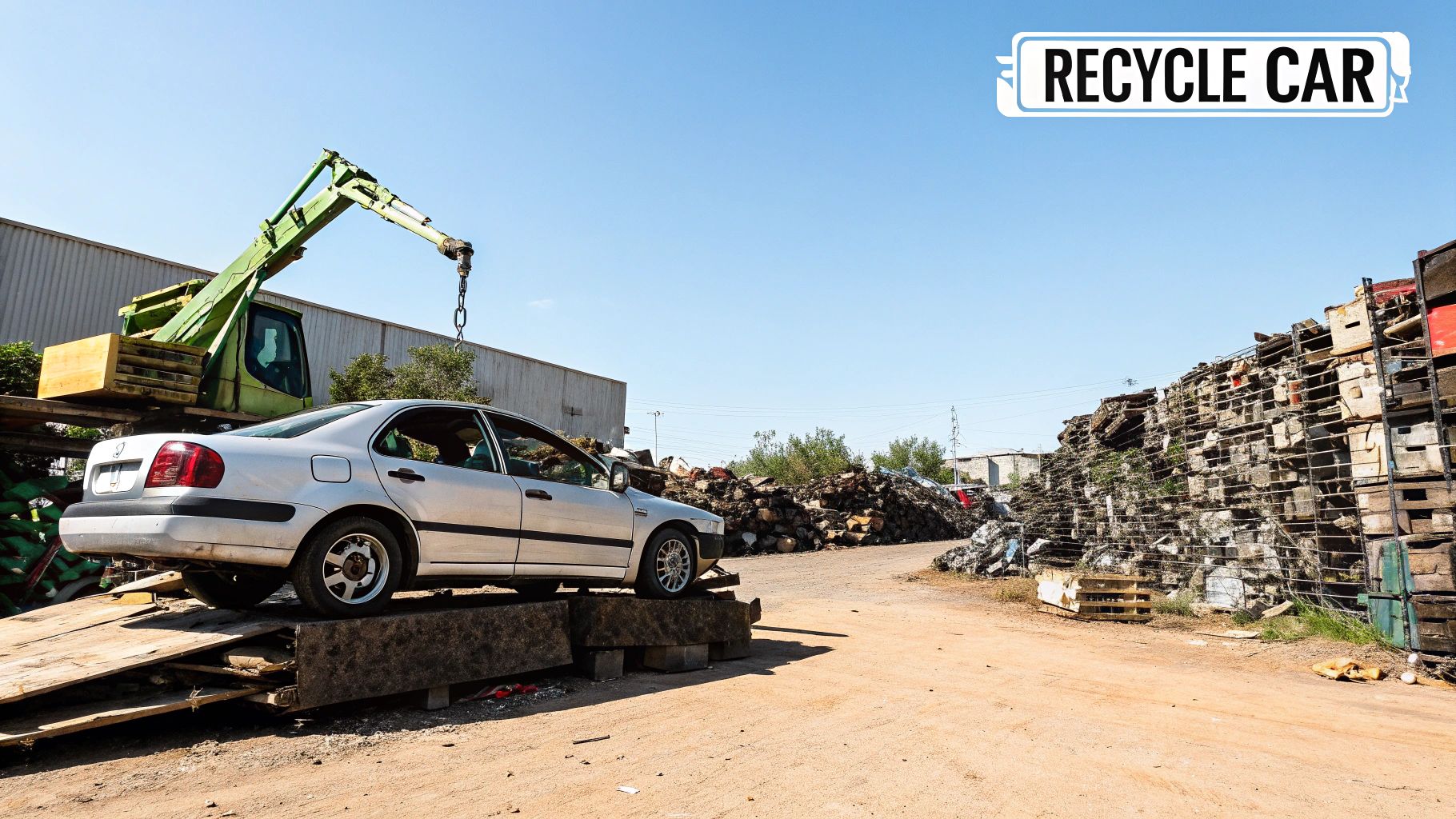
Let's be honest, the paperwork is often the part everyone dreads when getting rid of a car. But getting this bit right is probably the most important thing you’ll do. It’s what officially severs your ties to the vehicle, protecting you from any nasty surprises down the track—think speeding fines or toll notices showing up for a car you thought was long gone.
Getting the legal side sorted gives you total peace of mind. It’s your final act of ownership, ensuring a clean and permanent break.
Your Essential Document Checklist
Before the tow truck even reverses into your driveway, you need to have a few key things ready to go. While the specifics can differ slightly from state to state, the core documents you'll need are pretty standard across Australia.
Here’s a quick rundown of what to have on hand:
- Proof of Ownership: This is typically your car's registration certificate. It's the document that proves you're the legal owner and have the right to sell or scrap it.
- Photo Identification: A current driver's licence or passport is a must. This is used to confirm your identity matches the name on the ownership papers.
- Notice of Disposal: This is the big one. It's the official form you'll need to submit to your state's transport authority to finalise everything.
Having these organised beforehand makes the whole handover process a breeze. A good company like Auto Removal Adelaide will walk you through what's needed, but a little prep work on your end never hurts.
A Critical Reminder: Whatever you do, never hand over a signed transfer form with the buyer's details left blank. An "open" transfer is a recipe for disaster. It means you're still legally on the hook for anything the car is involved in until the new owner finally gets around to registering it.
Lodging the Notice of Disposal
The Notice of Disposal is your official statement to the government that the vehicle is no longer yours. It's not optional—it's a legal requirement.
This form is what breaks the legal connection between you and the car's registration plates. You need to fill out your section with all the correct details, including the exact date and time of the sale and the information of the person or company taking it. Thankfully, most states now let you lodge this online, which is by far the quickest way to get it done.
For instance, if you're in South Australia, you'll complete the disposal section on your registration papers and lodge it with Service SA. Be aware that you usually have a tight deadline. Failing to lodge it within 14 days can lead to fines.
The Importance of a Disposal Receipt
Even if you're just getting a few hundred dollars for a scrap car, always, always get a receipt. This piece of paper is your physical proof of the entire transaction and should be filed away safely. If any questions about the car’s ownership pop up later, this is your evidence.
A legitimate disposal receipt should clearly state:
- Your Details: Full name and address.
- Buyer’s Details: The name, ABN, and contact info for the car removal company.
- Vehicle Information: The car’s make, model, VIN, and registration number.
- Transaction Specifics: The date of disposal and the cash amount you received.
This simple document is your final layer of protection. It's the official confirmation that the vehicle is out of your hands, properly finalising your journey in learning how to dispose of a car.
Choosing the Right Way to Say Goodbye to Your Car
Figuring out the best way to get rid of an old car isn't always straightforward. Honestly, the right path really depends on what you're dealing with. A well-loved but running older car might find a happy new home through a private sale, while that rust bucket sitting in the driveway is a perfect candidate for a professional removal service.
It all starts with a bit of honest assessment. Is it still roadworthy, or is it just taking up valuable space? Answering that question will make it much clearer which option makes the most sense for you—and your wallet.
What's Your Car Really Worth?
First things first, you need a realistic look at your vehicle. A car that runs like a dream and has a current roadworthy certificate is in a completely different league from one with a seized engine or major body damage.
-
Selling Privately: This is where you'll likely get the most cash, but it's best reserved for cars that are still in decent nick and desirable. Just be ready for the legwork—advertising, fielding calls, and arranging test drives.
-
Trading It In: Swapping your old car at a dealership when you buy a new one is certainly convenient. The catch? You’ll almost always be offered less than what you could get selling it yourself.
-
Cash for Cars Services: This is the go-to solution for cars that are old, banged up, or simply won't start. A service like ours at Auto Removal Adelaide puts instant cash in your hand and tows the car away for free. No stress, no hassle.
Once you’ve picked your path, you'll need to tackle the paperwork. This little guide breaks down the essential steps.
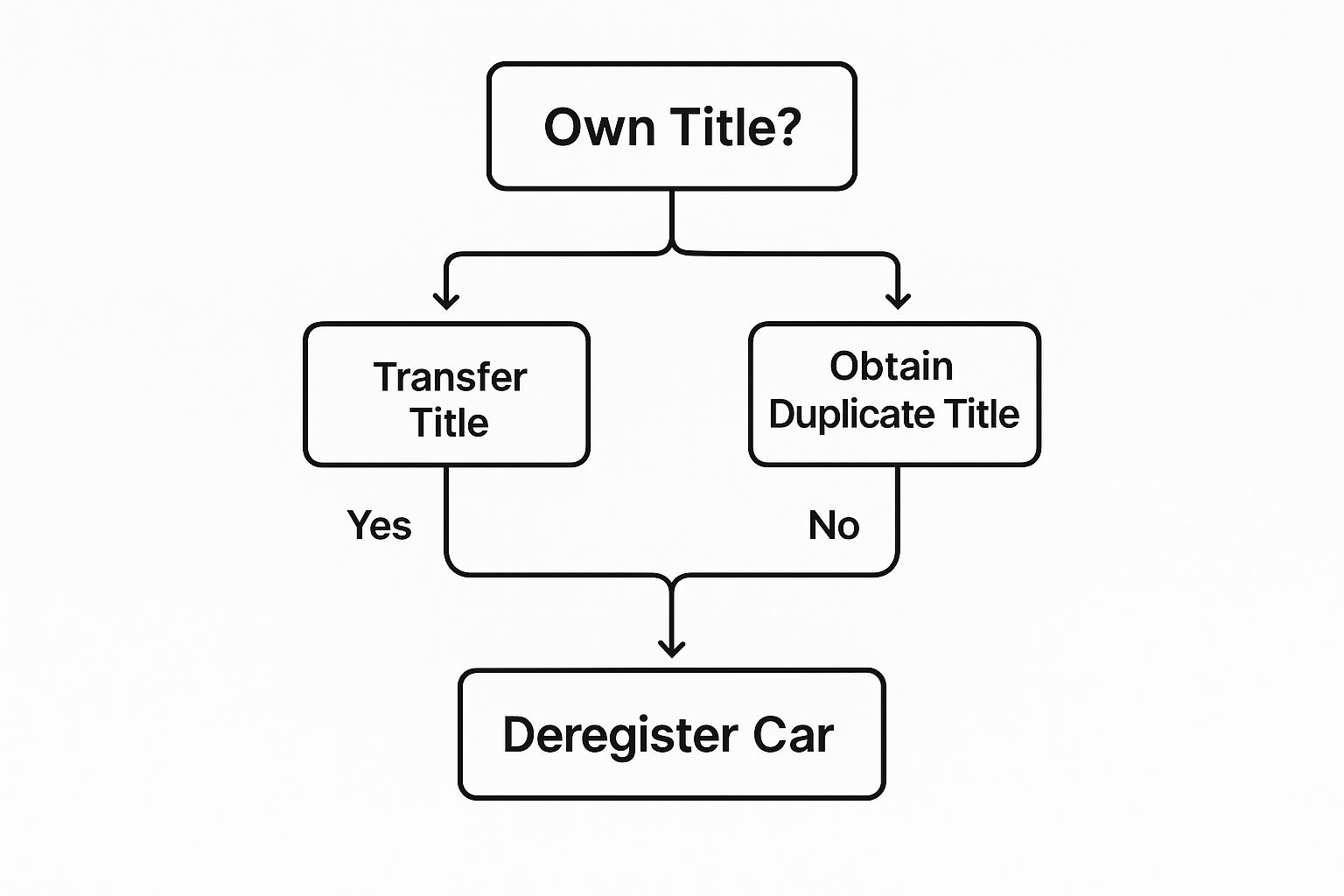
As you can see, whether you have the title deed handy or need to sort out a replacement, the end goal is always the same: properly deregistering the vehicle so you're no longer responsible for it.
Scrapping vs. Donating: Cash or Karma?
What if your car is truly at the end of the road? You're basically looking at two main options: scrapping it for cash or donating it to a charity.
Scrapping is a simple, direct financial deal. A professional wrecker assesses your car based on its scrap metal weight and what parts can be salvaged and resold. We've written a whole guide on this, which you can read here: selling a car for scrap.
Donating your car, on the other hand, is a way to give back and can often get you a tax-deductible receipt. It’s a fantastic choice if you're passionate about a certain cause and the cash isn't your main priority. You’ll just need to do a bit of research to find a charity that has a car donation program.
One thing I always tell people is to think about the environmental side of things. Professional auto wreckers are set up to safely drain toxic fluids and recycle a huge percentage of the car, which is a massive win for the environment.
This focus on responsible recycling is becoming a big deal nationally. Both the Federal Chamber of Automotive Industries (FCAI) and the Motor Trades Association of Australia (MTAA) are pushing for better ways to manage end-of-life vehicles. Their goal is to improve recovery rates and keep old cars out of landfills, which is exactly why using a certified recycler is so important.
By carefully considering these factors—cash, convenience, and environmental impact—you can confidently choose the disposal method that's the perfect fit for your situation.
Understanding the Environmental Impact
https://www.youtube.com/embed/2zd8RrvjksY
When your old car disappears down the street on the back of a tow truck, it’s easy to think "job done." But have you ever wondered where it actually goes? Understanding what happens next is a massive part of learning how to dispose of a car responsibly, because the environmental implications are huge.
An old vehicle isn't just a lump of metal. It's a complex mix of steel, plastic, glass, and a whole cocktail of hazardous fluids. If it's just left to rust in a paddock or, worse, dumped illegally, those materials can do some serious, long-term damage. Engine oil, coolant, brake fluid, and battery acid can easily seep into the ground, poisoning soil and waterways for decades to come.
The Lifecycle of a Scrapped Car
This is exactly where professional auto recyclers come in. When your car gets to a licensed facility, it isn't just tossed onto a pile and crushed into a cube. It goes through a careful, methodical dismantling process designed to recover every possible resource and keep environmental harm to an absolute minimum.
The very first job is always depollution. Technicians get to work draining all the fluids—oil, leftover petrol, coolant, and brake fluid—and pulling out the battery. These hazardous materials are stored securely before being sent off for specialised recycling or safe disposal. This one step alone prevents countless litres of toxic gunk from ever touching the environment.
From there, it's all about salvaging anything valuable and reusable. Parts like alternators, engines, transmissions, and even body panels that are still in good nick are removed, tested, and sold as secondhand parts. This gives perfectly good components a second life, which in turn reduces the demand for brand-new manufacturing.
By choosing a reputable disposal service, you're not just getting rid of an old car; you're actively participating in a circular economy. This process conserves natural resources, saves energy, and significantly reduces landfill waste.
Beyond the Metal
Once the depollution and parts salvaging is complete, the remaining shell—mostly steel and other metals—is sent to a massive shredder. This machine tears the car apart, separating the ferrous metals (like steel) from the non-ferrous ones (like aluminium and copper). These are all valuable commodities that can be melted down and used to create new products.
But the challenge doesn't stop there. In Australia, around 850,000 vehicles reach the end of their life every single year, which generates about 1.36 million tonnes of waste. While the industry does a great job of recovering a huge portion of this, a significant hurdle remains in recycling non-metal components like plastics, rubber, and textiles. Too often, these materials still end up in landfill. You can get a deeper look at the scale of this issue in the latest ELV summary report.
Choosing a certified auto wrecker is your guarantee that the vehicle will be handled according to strict environmental standards, maximising recycling and keeping all the nasty stuff contained. It’s a simple choice that genuinely makes a world of difference.
A Few Common Car Disposal Questions Answered
When you’re finally ready to say goodbye to an old car, a few last-minute questions always seem to pop up. That’s completely normal. Getting these final details sorted is the key to making sure the whole process is smooth, legal, and doesn't give you any headaches.
Here are the straightforward answers to the questions we hear most often from car owners around Adelaide.
What If I've Lost My Car Ownership Papers?
Don’t panic—it happens more often than you’d think. While having the original registration certificate makes things a bit quicker, you can almost always dispose of your car without it. Reputable car removal services have a process for this exact situation.
Typically, you’ll just need to show another form of ID, like your driver’s licence, to prove you're the owner. They might also ask you to sign a declaration of ownership form, which is just a simple document confirming you have the legal right to sell the vehicle. Any professional outfit knows how to handle this and will walk you through their steps.
How Much Money Will I Actually Get for My Scrap Car?
There's no single, fixed price for a scrap car. The final figure you’re offered really depends on a few key things. The main factor is the car's weight, which tells the scrap yard how much metal they can recover. But other elements can make a big difference to your quote.
- Make and Model: Some vehicles are just built with more valuable parts or materials that are in higher demand.
- Condition: Are there still good, reusable parts? A working engine, a solid transmission, or an intact catalytic converter can seriously bump up the price.
- Current Market Price: The value of scrap steel and aluminium changes daily, and that will directly affect your offer.
The best way to find out what your car is worth is to get a few quotes. Be upfront about the car's condition—let them know if it runs, what's broken, or if anything is missing. That’s how you get a truly accurate offer. For a deeper dive, check out our guide on selling a car for scrap.
Here’s a pro tip: Honesty really is the best policy here. A clear, accurate description of your car means the price you’re quoted is the price you’ll get. It avoids any awkward haggling when the tow truck driver shows up.
Should I Cancel My Rego Before the Car Is Scrapped?
Yes, 100%. This is a non-negotiable step when you're disposing of a car. Before the tow truck even hooks it up, you need to take the number plates off the vehicle yourself.
Once you have the plates, take them to Service SA to formally cancel the registration. This is what officially severs your legal ties to the car. As a bonus, doing this often means you’ll get a refund for any leftover portion of your rego and Compulsory Third Party (CTP) insurance. It's a nice bit of extra cash back in your pocket.
Should I Try Parting Out the Car Myself vs. Selling It Whole?
Look, you can sometimes make more money by selling a car off piece by piece. But it's a massive undertaking. You need the right tools, a good bit of mechanical know-how, and the space to dismantle the car and store all those parts until they sell. It's a real commitment of time and energy.
For most people, selling the car whole to a removal service is the far smarter choice. They do all the heavy lifting, pay you cash on the spot, and tow the vehicle away, usually on the same day. The sheer convenience of a single transaction is why almost everyone goes this route.
Ready to turn that old car into instant cash without the fuss? Contact Auto Removal Adelaide today for a free, no-obligation quote. Find out just how easy it is to get top dollar for your vehicle. Get Your Free Quote Now!

